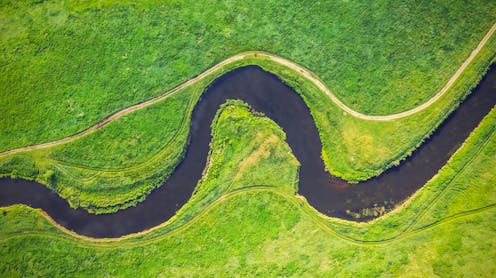
Suggesting that a river could be alive has the potential to change everything. Robert Macfarlane, one of Britain’s best-read writers on the natural environment, has done just this in his latest book.
At one level, Is A River Alive? is a travelogue of adventuring in extreme environments: a lucid, lyrical addition to a genre Macfarlane has made his own. His odyssey through the cloudforests of Ecuador, the stricken rivers of Chennai in India and the tumultuous rapids of the Mutehekau Shipu in north-east Canada has it all: larger-than-life companions, astonishing revelations about the natural world and inadvisable levels of personal risk (including some particularly scary whitewater kayaking).
Like all good odysseys, it’s a journey of psychological and spiritual self-discovery with a profound sense of nostos, an ancient Greek word meaning the journey home. But it’s much more than that.
This is a quest with an agenda and an urgency and one that puts its cards on the table from the outset. If a river is alive, our perceptions, laws and politics must change course to recognise that, Macfarlane argues.
That recognition must be rapid, because we’re already seeing the consequences of treating rivers – and the natural world – as “limitless source and limitless sump”, as he puts it. As an illustration, think of Lake Ontario in the 1990s, which he suggests was so chemically polluted that you could develop photographic film in its water.
Read more: Some rivers have 'legal personhood'. Now they need a lawyer
This is new territory for Macfarlane, who shows a sharper critical edge than in his earlier work but also engages more personally and emotionally with his material. Wrecked or restored relationships between humans and the natural world prompt the writer, like a contemporary William Blake, to throw down a moral gauntlet to those who hold economic and political power.
While lacking the anticolonial anger of Indian author Amitav Ghosh’s polemic The Nutmeg’s Curse, Macfarlane comes to comparable conclusions. Ghosh declares in his book that “if non-human voices are to be restored to their proper place, then it must be, in the first instance, through the medium of stories”. Is A River Alive? seeks to do that.
Interrogating a mystery
Macfarlane engages seriously with knotty complexities. A river may be alive, but not in any way that can be readily incorporated into human systems. “If you interrogate a mystery, don’t expect answers in a language you can understand,” he muses. He also insists on the necessity of opening our perceptions to the life of and in a river: “to imagine that a river is alive causes water to glitter differently.”
Macfarlane adopts an animist outlook, declaring non-human entities to have voices and worth in and of themselves. His stance is part of a wave of thinking and writing that is transporting such beliefs from the margins of western spirituality and scholarship into mainstream literature.
This is vital work, but the challenge shouldn’t be overestimated. If you address these questions from a government perspective, you quickly get quagmired in legal systems and questions of ownership. The result, critics say, is ecological injustice, silencing the voices of nonhumans and of the humans who speak up for them. Yet action to give legal rights to rivers is increasing, from the Rio los Cedros in Ecuador to the Whanganui in Aotearoa New Zealand.
Logics of inaction
These are important victories, and work to foreground the rights of nature is gathering pace in the UK. In my own city of Sheffield, my colleagues and I are part of a growing network of academics and community organisations working with the River Dôn project, exploring how the river that runs through our city centre could be given a voice, legal status and, we hope, stronger protection from environmental damage.
This work joins an increasing flow of thinking in universities, cities and communities that challenges extractive mindsets. But such voices remain sidelined even as the evidence of the damage wrought by the rapacious exploitation of Earth becomes starker.
My own research has shown how “logics of inaction” persist – even when policymakers know they need to invest in and protect the natural world (in cities, urban parks and wild places), they find reasons to avoid doing so. More often than not, it comes down to money – finances are too tight, or the benefits aren’t obviously quantifiable.
Even when the benefits of natural spaces are compiled and described in terms that pose no philosophical challenge – they support human health and wellbeing, relationships, participation in society – these benefits are deemed insufficient to stop the cycle of neglect. Indeed, as UK chancellor Rachel Reeves recently declared, developers should “stop worrying about bats and newts” and “focus on getting things built”.
Is a River Alive? may not stem the tide of environmental destruction. But for those frustrated by the logics of inaction of short-term decision-making, it provides timely and necessary inspiration.
Don’t have time to read about climate change as much as you’d like?
Get a weekly roundup in your inbox instead. Every Wednesday, The Conversation’s environment editor writes Imagine, a short email that goes a little deeper into just one climate issue. Join the 45,000+ readers who’ve subscribed so far.
Julian Dobson does not work for, consult, own shares in or receive funding from any company or organisation that would benefit from this article, and has disclosed no relevant affiliations beyond their academic appointment.
This article was originally published on The Conversation. Read the original article.







